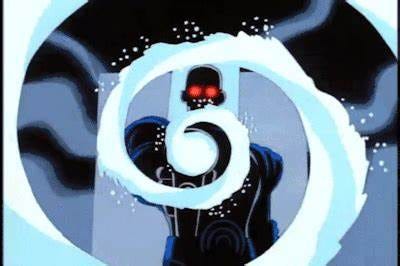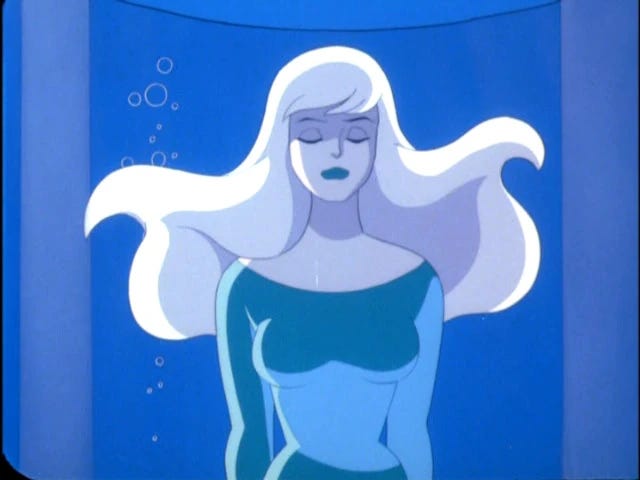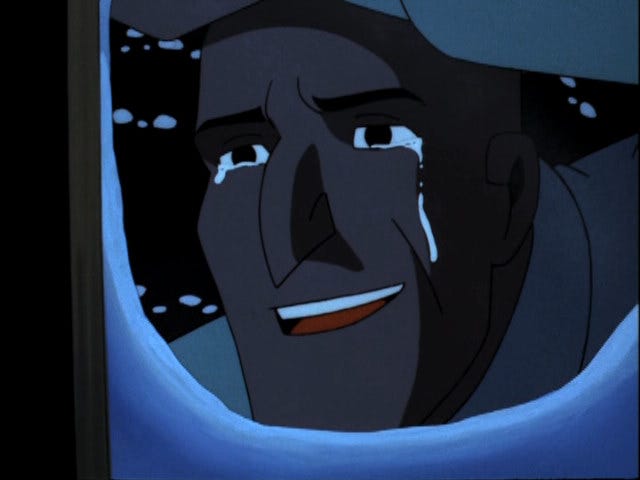What Mr. Freeze Has to do with Kierkegaard and the "Sickness Unto Death"
Watching the DCAU out of order
The Timm/Diniverse has so much content -- honestly more than you need to watch if you're curious about this beloved and impactful Batman franchise. As I previously explained in The Best of Ra's al Ghul, I suggest choosing one character with a good arc and exploring the various installments that helped develop it. A few stories span generations, and one such story is that of Mr. Freeze.
Possibly the most notable way that Batman: The Animated Series permanently changed DC was by reviving a throwaway villain from Bob Kane's comics and giving him dimension and pathos. In "Heart of Ice" (Episode 14), Mr. Zero is re-dubbed Mr. Freeze, a seemingly robotic mass killer with a monotone voice. "This is a personal vendetta," he tells Batman. "It doesn't concern you." Freeze is eventually revealed to be Dr. Victor Fries, a cryogenics scientists desperate to save his terminally ill wife, Nora. The doctor had frozen her while he searched for a cure. That research put his benefactor $3 million in debt and, when the benefactor came to pull the plug on the whole operation, Fries threatened violence, believing himself justified in his noble pursuit. Now acting in self-defense, the benefactor fought back, and the doctor's DNA was mutated by damaged cryo technology. Although he could potentially live forever inside his cryo suit, Fries would overheat and die outside of it. Nora, we assume, did not survive. Fries wants revenge.
Mr. Freeze puts up a sociopathic front, but he's one of the most "human" antagonists in the gallery. Far from feeling too little, he seems overwhelmed by a sense of bitterness and longing. He even has a sense of personal responsibility (unusual for a villain). He apologizes to Nora for failing her.
Nora Fries herself seems to have become an infallible (and dehumanized) Madonna figure. We never hear her speak. We never even see her eyes open. We are left to assume that she supported her husband's plans to freeze her and save her life. (The campy live-action TV series, Gotham, of all things, fleshes her out more as a woman who would rather freeze herself than enable her husband's murdering in her name.) Rather than a person, Nora Fries is a passive object of fervent worship for her husband. For the audience, she is a symbol of everything he cannot have.
Batman can't help but empathize with Fries' loss. He is, after all, "vengeance." One can understand why Mr. Freeze would want the people responsible for his accident to pay. He challenges Mr. Freeze, however: Should vengeance really be pursued at the cost of innocent lives? To Mr. Freeze, the answer is yes. Nothing matters except Nora.
Batman, of course, foils Mr. Freeze's plans, but he also exposes the injustice Fries suffered. In "Deep Freeze" (Episode 84), we learn that Nora is still alive in suspended animation. The man who invested in keeping her alive, Grant Walker, is a bit of a Walt Disney parody (though contemporary audiences may instead compare him to Andrew Ryan from Bioshock). Walker saved Nora because he hoped to use her as leverage in convincing Mr. Freeze to give him the same immortality that tortures Freeze. To Mr. Freeze's credit, he is loathe to grant Walker's wish, which would actually be a curse. Freeze also attempts to save the would-be victims of Walker's mad schemes. Of course, Walker has barely gotten what he wants before he realizes he doesn't want it. He is doomed to live forever at the bottom of the sea.
In the direct-to-video movie, Batman & Mr. Freeze; SubZero, Mr. Freeze is back to desperately trying to save Nora's life (and killing anyone who threatens it or stands in his way). Kidnapping Barbara Gordon (Batgirl) to steal her organs is probably Freeze's lowest point. Nevertheless, she, Batman and Robin endeavor to rescue Freeze from a fiery oil rig. He escapes. In the dénouement, Freeze learns that Wayne Enterprises has ensured that Nora received the help she needed. He cries tears of relief, gratitude, joy — maybe even hope.
Although The New Batman Adventures was overall less poignant than the original series, "Cold Comfort" (Episode 3) contains what I think of as one of the most memorable scenes. An artist has just revealed his life's work, a massive painting of Gotham City, when Mr. Freeze appears to compliment the technique and then blast the piece with his ice gun, disintegrating the canvas beyond repair. The artist is in tears. Freeze has apparently decided that if he can't be happy, nobody can. He has already destroyed an archaeologist's discovery decades in the making, and is even willing to kill a stranger's dog.
Batman, Robin and Batgirl discuss what's become of Nora Fries. She's healthy, whole, and awake but, for some reason, Victor Fries never returned to her. The heartbroken Nora had eventually moved on to someone new. Batman discovers that Freeze's condition has so deteriorated his flesh that he is now little more than a disembodied head in a robotic suit. He can't bring himself to face Nora this way. With this deep sense of loss, he is lashing out at the world.
In researching this character, the phrase “sickness unto death” kept popping into my head. I couldn't remember where I had heard it or what the sickness was. An internet search reminded me that The Sickness Unto Death is a work by the brilliant existentialist Søren Kierkegaard. The sickness is not one that can kill the body. Rather, the sickness is despair. To Kierkegaard, that is what the entire concept of "sin" boils down to. Physical death is only a step in the journey of neverending coexistence with the Absolute, but spiritual death is the real horror, a suffering that cannot end because it rejects the eternal source of all good things (God, who is Love) and the self (created, grounded and sustained in Love). Kierkegaard argued that the opposite of despair was faith, which he defined as "[resting] transparently in the power" (Love) on which our existence is established.
Mr. Freeze was immortal in a sense, but his immortality was, in actuality, eternal death. Even his romantic devotion to Nora distorted grotesquely into a hatred for the world and himself. Batman has similar dark nights of the soul, but his response is to never stop fighting for the good. This is love in action, a kind of living faith. It is the opposite of despair.
That Mr. Freeze suffered from the sickness unto death is most apparent in his Batman Beyond episode, "Meltdown" (Episode 7). Bruce Wayne has kept Mr. Freeze alive for decades at a Wayne-Powers laboratory. Now, someone wants to conduct clandestine research on Freeze. If they can clone him a new body without reproducing the damage to his DNA, an insidious character at Wayne-Powers might also escape the consequences of his own mad science. The seductive Dr. Stephanie Lake assures Mr. Freeze that "there may be some momentary discomfort" before he experiences torturous pain. The next waking moment, he finds himself in a normal human body.
This is the first taste of hope Victor Fries has had in at least twenty years. He is seemingly a normal person. Although Nora has long since passed away, he is quick to found a charitable foundation in her honor and set about making amends to all the people he harmed as Mr. Freeze. The new Batman protégé (who also has a criminal past) is somewhat touched. The original Batman is cynical and claims Fries is simply trying to buy people off. He demands that Victor be watched closely. But even after one of Mr. Freeze's old victims attempts to gun him down, Victor is both gracious and aware of his own need for grace. The young Batman, who has just saved his life, observes this curiously. Dr. Lake seems to be developing an attraction to Victor. Victor doesn't break eye contact with the man from whom he took everything.
Tragically, the new body begins to revert to the same mutated state in which Mr. Freeze's old body languished. The scientists decide they'll need to dissect Victor to figure out what went wrong. Dr. Lake is revealed to have the true “heart of ice,” watching coldly through the window as she attempts to kill Victor with heat stroke. He escapes and returns as Mr. Freeze. "Remember," he tells her dryly, "there may be some momentary discomfort." Her haunting shriek echoes across the compound as she is penetrated by giant shards of ice.
Once again, Mr. Freeze is in full vengeance mode. His plan is to blow up the entire Wayne-Powers compound. For reasons revealed in another story, a second villain named Blight attacks and nearly kills Freeze. When Batman intervenes, Blight attempts to kill Batman. Mr. Freeze takes damage defending the boy. With Blight out of the picture for now, Freeze no longer has the heart to commit another mass killing. Rescuing the young Batman reveals who he truly wants to be. Nevertheless, Batman cannot convince Freeze to fight for his own life. Freeze throws up a wall of ice between them. Batman must flee in a shot reminiscent of the old Batman's flight at the end of SubZero as the facility collapses all around Freeze, crushing him to death.
As the vigilantes reflect on Freeze's story, the younger of the two admits that he may have been wrong to hope Freeze could change. Bruce Wayne concedes that both of them saw different aspects of who Victor was. Mr. Freeze did want something to hope for and he did want to make something good of his life. Because the foundations of his life were so very temporal (Nora, his own health, Dr. Lake) it was simply too easy to contract the sickness unto death.
Any episodes you would have included or left out? What do you think of the somewhat more recent decision at DC Comics to rewrite Nora as a woman born in the 1940’s who never even met Victor, and their entire relationship was a delusion he suffered while working in a lab? Let me know in the comments and subscribe for more premium nerd content, NERD











Excellent analysis! Mr. Freeze seems like a good-intentioned person, but he's actually being very selfish by threatening innocent people. As if the whole world revolves around Nora! Fun article, very enjoyable to read.
"Heart of Ice" cemented BTAS as the heart of Batman. Timm understood Batman in a way that was similar to Frank Robbins, who in my view "got" the Dark Detective like few others did.